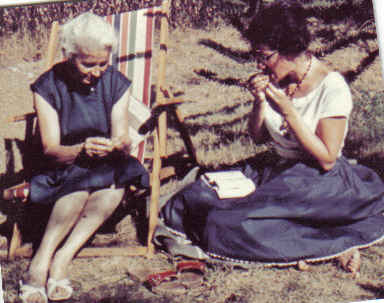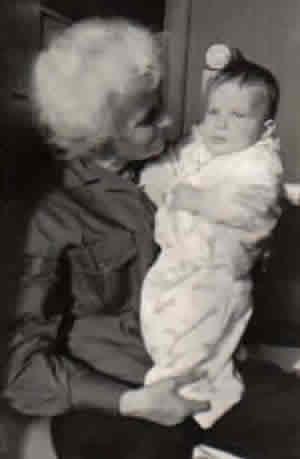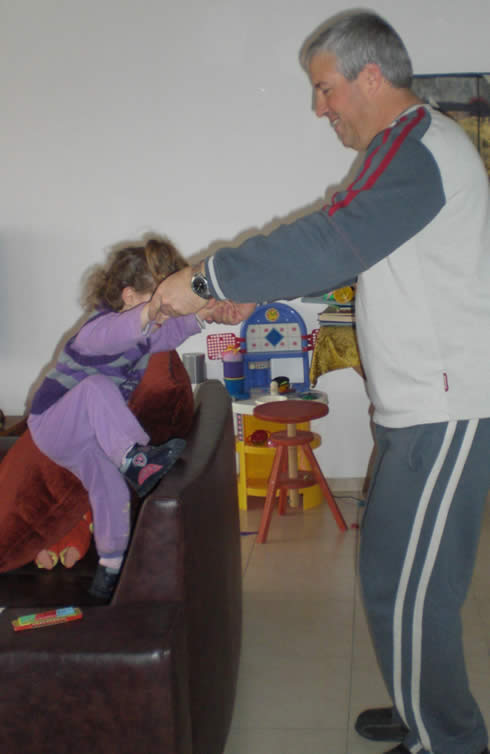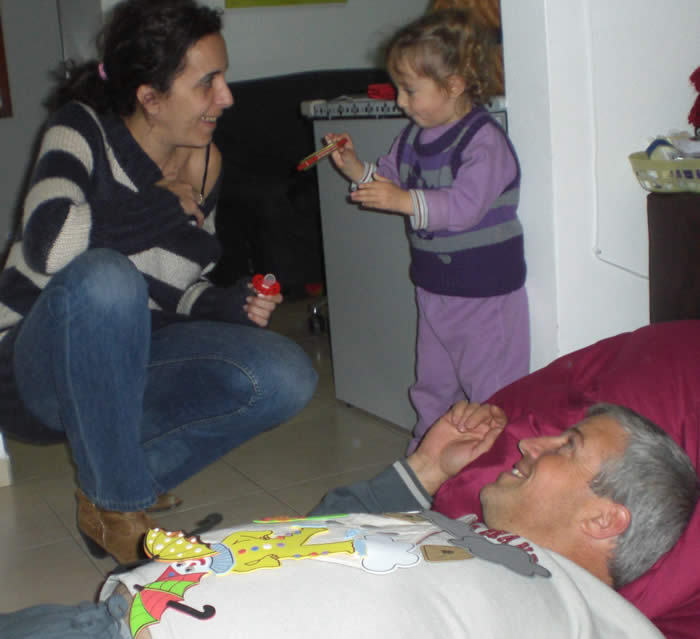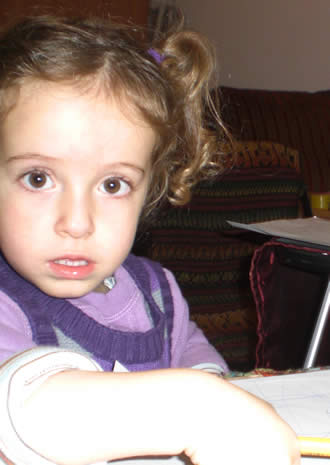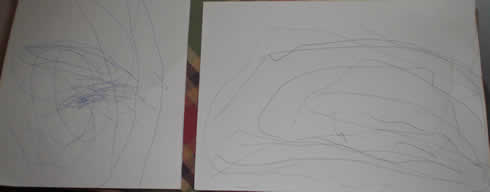| The
Purpose of HEALING - K.I.S.S.
- as stated 12 years ago - was and is
to help me and my potential P E E R s
"to HEAL ourselves into WHOLEness,
and - by extension - all of CREATion!" |
|
I focus my experiencing and awareness on being
"a pioneer of Evolution
in learning to feel":
I let my Body vibrate and my Heart 'womb'
pain, shame, fear, boredom, powerlessness,
so feelings can >heal >guide>fulfill>evolve,
and ~~~ offer ~~~"goldmines"~~~ to us all!!
"I
want you to feel everything, every little thing!"
|
|
K.I.S.S. -
L O G 2
0 0 8
Keep It Simple Sweetheart
| |
1
|
2
|
3
|
4
|
5
|
6
|
7
|
|
1
2
3
|
How
Learn
And |
I
The
Train
|
Heal
Conditions
In |
Myself
For
Creating
|
Into
Heaven
Those
|
Whole
On
Conditions
|
Self-acceptance
Earth
Daily |
sanctus-qadosh
sanctus-holy
sanctus-heilig
|
|
intro
to k.i.s.s.-log ~ library
of seven years ~ HOME
~ contact
February
20,
Wednesday, - at Shoham
~~~~my mother's death-day (Febr. 20, 1984)
back
to past ~~~~~ forward to future
image of the day
2008_02_20--
2013_02_20 DELICIOUS
DELETION DELICIOUS
DELETION
|
|
hodayot [thanksgivings] for
today
8:30
My Body,
my Partner,
my God
I give thanks to our four
taste receptors,
which let us sense sweet and salty, sour and bitter tastes,
and combinations between them.
We so much enjoy eating in general
and eating Immanuel's cooking in particular!

I give thanks to all the amazing skills of my son,
two of them being so helpful on this day which is dedicated
to learning:
his know-how in Internet matters
[after problems with e-mail connections
he now switched me to "Gmail"
and taught me how to use it],
and his grasp of all the concepts and
terms of computer software,
which will - for
instance - enable me to enrich
the entry of each log
with the divine modulation of the three "Sanctus"
accords
of Schubert's Last Mess in E flat major
|
My mother's death day
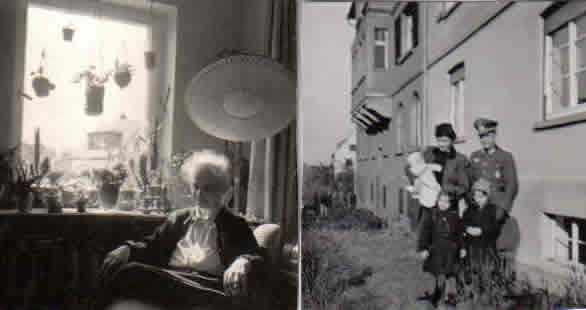
"Accidental Composition":
a last family photo Nov. 1942 ,before my father was killed
(Sicily August 1943),
during his short leave for seeing his newborn son
And my mother - alone - probably in the year of Immanuel's
birth, 1963,
when she took care of him, while I lived at Tuebingen for
half a year,
working as an assistant of the Institutum Judaicum of the
university,
and preparing for another attempt to graduate in Protestant
Theology...
|
 |
More from my letter
to Dr. Melitiades, Hospital Calw, Germany.
27.6.1983 :
"...Seit 25 Tagen bin ich taeglich drei bis fuenf Stunden
bei meiner Mutter im Krankenhaus und konnte Ihre und der Schwestern
grosse Fuersorge verfolgen. Ein unglaublich rapider Heilungsprozess
hat zur Wiederherstellung der meisten physiologischen Funktionen
gefuehrt.Wir danken ihnen dafuer.
.....................................
Sie wissen, dass der Gehirnschlag die eigentliche Faehigkeit zur
Lebensgestaltung zerstoert hat, naemlich die Faehigkeit, Verantwortung
zu uebernehmen fuer das, was einem geschieht.
Zwar hat meine Mutter fuer Leute, die nur kurz mit ihr in Beruehrung
kommen, Reflex-Phrasen parat, die hoeflich, freundlich, ja oft
amuesant sind. Dadurch konnte sie in diesen 16 Jahren immer wieder
Aerzte und andre Leute, von denen ihr Schicksal abhing, ueber
ihren wahren Zustand taeuschen (z.B.: "Wie
geht es ihnen, Frau Guth?" "Nun ja, man muss froh sein,
wenn man noch jeden Tag aufstehn kann,." Oder: "Man
kann alt werde wie 'ne Kuh, man lernt immer noch was dazu".)
Meine Schwester und ich aber sehen, dass grade die Besserung ihres
koerperlichen Zusatnds auch wieder das quaelende "Wissen"
um ihren Zustand verstaerkt hat.
Das wird manchmal ganz direkt formuliert, mit gequaeltem Gesichtsausruck;
"Ich bin ja ganz verwirrt, ich kann
gar nicht mehr denken", oder "heute
kann ich mich aber gar nicht konzentrieren". Symbolisch
aber ist die ewige Frage; "Was fuer
einen Tag haben wir heute?" Oder:
"Heute ist Sonntag, morgen ist Montag (oder andere,
kaum je zutreffende Wochentage) Stimmt das?'
Sie kann diese Frage bis zu dreimal in der Minute, oder bis zu
dreissig Mal in der halben Stunde wiederholen. Fuer mich ist es
der Gradmesser fuer das Auf und Ab ihes mentalen Zustandes. Wenn
ich sie manchmal frage, warum denn das so wichtig sei, kommt -
selten eine erschuetternd rationale Antwort: "Damit
ich morgen von heute unterscheidenn kann", oder;
"damit ich uebrhaupt noch weiss, wo ich bin",
oder "damit ich mich ueberhaupt noch
auf der Welt zurechtfinde". Es muss furchtbar sein,
so ohne jegliche Orientierungsmoeglichkeit zu leben, so als waere
man in den Weltraum geworfen, ohne oben und unten, ohne Tag und
Nacht.
Nachdem ich zweieinhalb Wochen pruefte, welche Moeglichkeiten
zur Bereicherung ihrer unzusammenhaengenden Lebensaugenblicke
noch vorhanden sind und diese Moeglichkeiten ausschoepfte (z.B.
kann sie noch manchmal singen, sogar mit zweiter Stimme zu einem
bekannten Lied), kam ich - wie meine Schwester schon lange - zu
dem Schluss, dass dies ein unwuerdiges Leben ist.
Ich begann, ueber eine andre Moeglichkeit fuer sie nachzudenken,
naemlich "sich sterben zu lassen". Nachdem meine Schwester
und ich uns unsre moeglichen Schuldgefuehle klargemacht hatten
("Wollen wir es uns bequem machen?"
"Koennen wir wissen, was fuer sie gut
ist?") begannen wir vor 6 Tage meine Mutter zu pruefen,
ob sie lieber leben oder sterben will. Obwohl natuerlich auch
bei ihr ambivalente Aussagen kommen, ist die Sehnsucht, "vom
Herrn Jesus empfangen zu werden", wie sie den Tod
sieht, doch groesser. Aber sie war nie auf die Idee gekommen,
dass der Mensch auf sein Sterben-Koennen einen Einfluss haben
koennte. Ihr staendiger Witz: "Der
liebe Gott will mich noch nicht haben, und fuer die Hoelle bin
ich ihm zu schade" , ist nur einer ihrer Ausdruecke
fuer das Gefuehl ihrer Ohnmacht.
Ich begann also, auif alle moeglichen verbalen und non-verbalen
Weisen, ihr zu zeigen, dass sie diese tiefste Freiheit noch besitzt,
naemlich ihr Sterben zu waehlen und sich auf ihren Tod vorzubereiten.
Folgendes Gebet [see above]
habe ich fuer mich und fuer sie gedichtet, und wenn wir es oft
zu einer ihr bekannten Melodie im evangelischen Gesangbuch singen,
ist sie davon jedesmal tief beruehrt .
Gleichzeitig dachte ich sehr viel ueber Ihre Aufgabe als Arzt
nach. Es fiel mir eine alte Deutung zu dem groessten juedischen
und christlichen Gebot ein:
" ' Du sollst deinen Naechsten lieben
wie dich selbst', bedeutet: "Du sollst ihm einen schoenen
Tod waehlen!"
Dies ist sogar die einzige ausdrueckliche Interpretation zu diesem
Bibelvers, den ich waehrend meines Doktorstudiums in der alten
juedischen Literatur fand. Natuerlicih war damas die Art der Hinrichtung
gemeint, aber wenn Sie, verehrter Herr Doktor, an Ihren eigenen
Tod denken, wuerden Sie da nicht wollen, dass die Liebe Ihrer
Naechsten sich darin ausdrueckt, dass sie Ihnen ein schoenes Sterben
ermoeglichen??
Unter einen schoenen Sterben fuer mich selber verstehe ich, dass
ich so bewusst wie moeglich das Erwachen auf der Schwelle des
Todes erleben darf und dass meine Schmerzen nicht so gross sind,
dass dieses Bewusstsein vernebelt wird. Ich glaube, die aerztliche
Kunst ist weit genug entwickelt, dass sie sehr oft ein solches
Sterben ermoeglichen koennte.
......
Zu einem schoenen Sterben gehoert auch die liebevolle Umgebung.
........
Deswegen habe ich mich zu dem Entschluss durchgerungen, sie nach
Israel zu holen, obwohl ich annehme, dass der Flug mit "Risiko"
verbunden ist, und obwohl meine 2 1/2 Zimmerwohnung, die ich mit
meinen drei fast erwachsenen Kindern teile (ein Sohn ist beim
Militaer und die Todchter wird demnaechst eingezogen), nicht gerade
der ideale Pflegeplatz ist. Ich hoffe aber, ich habe aus meiner
Beobachtung der Schwestern hier - und aus meinem eigenen Krankenhauspraktikum
vor 24 Jahren- genuegend ueber die Pflege eines alten Menschen
gelernt und werde von Ihnen alle noetigen Informationene bekommen.
So werde ich ihr - falls Sie damit nicht schon jetzt im Krankenhaus
beginnen koennen (???) - unter meiner Liebe ein wuerdiges Sterben
bereiten.
Alle diese Beobachtungen und Folgerungen gelten ja nicht nur fuer
meine Mutter, und ich hoffe, mit diesem Brief auch einen Betrag
zur Diskussion ueber die sog. "Kuenstliche Lebensverlaengerung"
zu leisten. Meiner Meinung nach geht es nicht um eine negative
Entscheidung, Leben n i c h t zu verlaengern, sondern
um eine neue, den Tod in das Leben integrierende, grundsaetzliche
Einstellung: Ich sehe die Kroenung meiner Freiheit zum Leben darin,
mich taeglich bereit zu halten fuer meinen Tod, und - wenn es
an der Zeit ist - mein Sterben aktiv anzunehmen, und wenn moeglich,
aktiv zu gestalten.
In der Hoffnung, dass Sie Zeit finden, die Gelegenheit zu nuetzen
und sich zusammen mit uns ueber eine Frage, vor der Sie wohl oft
stehen, zu besinnen, -
Rachel
Bat-Adam ---- Ursula Kasper,
Abschriften an den Chefarzt der Inneren Abteilung und an die Stationsschwester
Sr. Gertrud.
P.S. Es eilt mit der Entscheidung, denn wir wollen dem Pflegegeheim
bis zum 1. Juli kuendigen, und ich wuerde gerne gleich mit den
buerokratischen Laufereien fuer die Ueberbringung nach Israel
beginnen, da ich so rasch wie moeglich zu meinen Kindern zurueckfliegen
moechte..... |
3.Juni 1961,
Jerusalem, Israel
[an example of how I so often
used to delude myself and to rationalize , concerning my mother's
love to me. Also an example of the constant "thorn in my
flesh" concerning my overstressed learning and living.]
[I
was deeply in love with Rafael, I was still deeply in love with
Martin, my fiance, and I cherished my suitor Wim from Holland]"Besser
als jede Berufsschauspielerin", "das ist kein Kompliment,
das ist eine Tatsache", "ich sage Ihnen in wirklichem
Ernst, Sie versaeumen eine grosse Karriere, wenn Sie nicht Fernsehsprecherin
werden in Deutschland."(10.
Juli 1961 in the port of Venice)
|
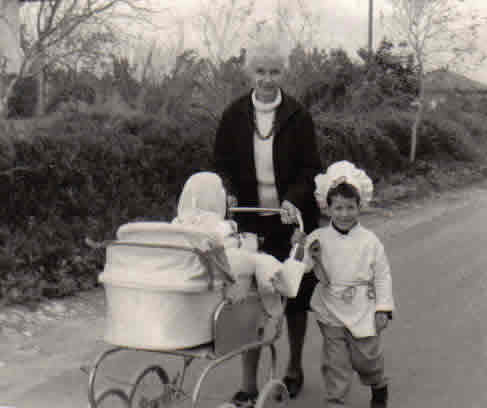
]
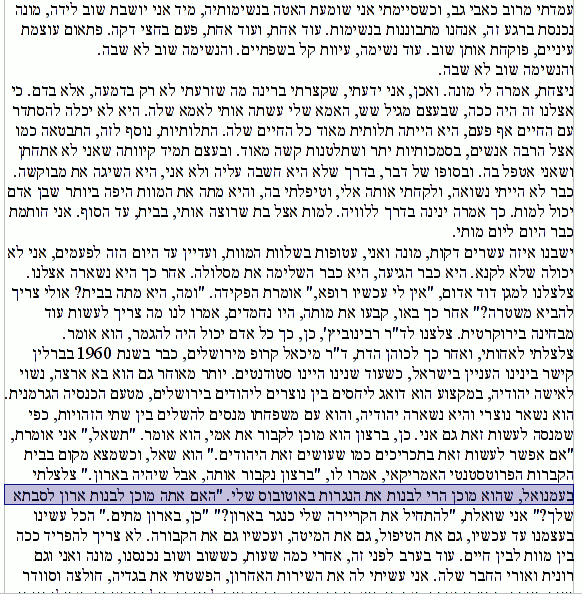
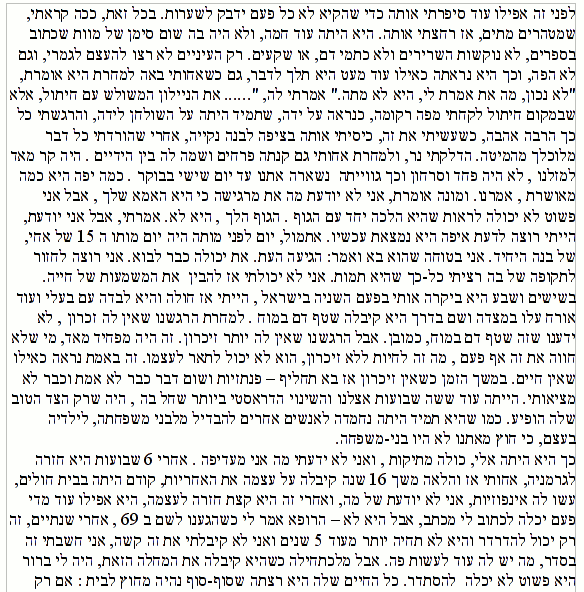
I couldn't have given my mother a sweeter
present today
than the galaxy sound-button on top of the K.is.s.-log-Pages
with Schubert's Sanctus from his last mass in E flat major
It was she who took me to her choir's rehearsal
of Bach's Matthaeus Passion,
when I was 10...
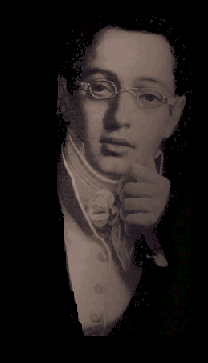
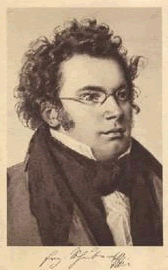
Alle drei auf
dieser CD eingespielten Werke
stammen
aus dem Sterbejahr Franz Schuberts.
Es ist also nicht verwunderlich,
wenn Interpreten und Hörer immer wieder Todesahnungen
heraushören möchten.
Helmuth Rilling weist in seiner Deutung allerdings einen
anderen Weg.
Die verinnerlichte Führung seiner bewährten
Gächinger Kantorei
zeigt Schubert vielmehr als einen Romantiker,
der sich von überkommenden musikalischen Idealen
der Wiener Klassik befreite
und das Individuum
in den Mittelpunkt des Gottesdienstes stellte.
2008_02_20---
2013_02_20 DELICIOUS
DELETION DELICIOUS
DELETION
|
|
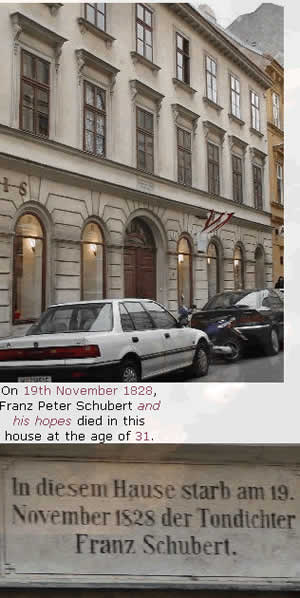
|
Nourishment
from Others
Missa Solemnis in E flat /Es Dur
Franz Seraphicus Peter Schubert
(January 31, 1797 – November 19, 1828)
was an Austrian composer.
He wrote some 600 Lieder, seven completed symphonies,
the famous "Unfinished Symphony", liturgical music,
operas,
and a large body of chamber and solo piano music.
He is particularly noted for his original melodic and harmonic
writing.
While Schubert had a close circle
of friends and associates who admired his work .., wider appreciation
of his music during his lifetime was limited at best. He was
never able to secure adequate permanent employment, and for
most of his career he relied on the support of friends and
family. Interest in Schubert's work increased dramatically
following his death.
Schubert’s
last Mass, in E flat, was long something of a Cinderella
among the great works of Schubert’s final year: ...Today,
though, the Mass is increasingly acknowledged as a powerful
and disquieting masterpiece, more monumental than
its predecessor, in A flat, but likewise seeking to
reconcile liturgical grandeur with Schubert’s own subjective
romantic feeling. Its concern for monumentality is
most obvious in the huge set-piece fugues at the end of the
Gloria and Credo. But even in these most impersonal sections,
liturgical tradition is coloured by an individual and sometimes
unsettling chromaticism.
Schubert composed the E flat Mass during
the summer of 1828...The mass was due to be performed at a
ceremony to mark the founding of a Society for the Performance
of Church Music in October. But the choir could not cope with
the music’s difficulties in the time available. And
when the premiere finally took place, on 4 October 1829, conducted
by Schubert’s brother Ferdinand, the composer had been
dead nearly a year.
If Bach was born to faith and Beethoven, in the Missa solemnis,
arduously achieved it, Schubert’s faith was more tentative
and heterodox. He was ill-at-ease with conventional Catholicism,
.... Influenced by his first, ecstatic encounter with the
poetry of Goethe, Schubert’s religious outlook
came to embrace elements of humanism and pantheism, perhaps
even polytheism. Goethe’s deity was not the
God of orthodox Christianity (the cross and its associated
suffering and guilt were anathema to him), but rather
the ‘all-loving father’... For Goethe –
and we might infer from his choice of poems, for Schubert
too – mankind was also part of Nature, and hence
the divine.
2008_02_20---
2013_02_20 DELICIOUS
DELETION DELICIOUS
DELETION
|
2008_02_20---
2013_02_20 DELICIOUS
DELETION DELICIOUS
DELETION
|
In the Sanctus, startling, disorientating harmonic
shifts and heaven-storming crescendos conjure an
apocalyptic vision worthy of Turner or late Goya. After the
fugal ‘Osanna’, the Benedictus contrasts a tender,
tranquil melody for the soloists with vigorous imitative choral
writing. The mass’s climax comes in the C minor Agnus
Dei, music of violent anguish never previously encountered
in a setting of this text.
Photos
from the
best site I found about the Missa in E flat
|
|
Finetuning
to my Present
The day yesterday was so harmonious,
that it seems, as if there had be no challenges and lessons.
How can I document these too, when they concern the actors in
my drama,
not in the relationship between them and me, but among themselves?
Since they are ME, I cannot say, it's none of my business,
I cannot say this about any human being or any creature on this
planet..
One of the most difficult lessons I had to learn in 70 years,
is,
that this caring can only rarely manifest in exterior interaction
or action,
but "rarely" is not the same as "never".
And when, then, is interaction, even interference - appropriate?
And how can I report on this in a way
that would raise their self-esteem
in case they would read my documentation?
[memories - see right frame]
I reminded Micha of Ra'ayah's dreams
and went into details he might have forgotten.
I quoted a sentence of her, said to his sister,
in which her giving-up was epitomized.
"Just be aware, that all she
has buried and denied,
might be triggered on Friday mornings,
when you race through hills and valleys with your motor bike
friends."
Micha had listened attentively .
"I'll be aware!"
he promised.
May this be one of the "rare" moments of grace with
results in the future! |
"Driving
Backward into the Future" = "Closeups
to the Past" = Healing&Harvesting my Past
One such situation was in the car with
Micha
through the mud and puddles.
"How does Ra'ayah feel - now - that
you are full-filling your dream
of regularly enjoying your motorbike-in-nature outings?"
"But she doesn't have to renounce anything because of that!"
"Of course not!
I'm talking about the unfull-fill-ment of her own dreams,
which may be triggered by your full-filling yours.
Remember that contrabassist+Security agent at Ramat-Hadar ...
who for many years had been my distant, but consistent suitor.
When I started to
live in my bus - on Yanina's
greenhouse area -
I once met him and he said, with utmost fury and frustration:
"Only YOU allow yourself to be a
free bird!"
And we never met again.
There was also that artist at Kibbutz
Ga'ash,
the first place I parked, after my mobile home really began
to move,
- I visited friends, for one night,
but asked for permission to stay for a week,
after at night Maya, my dog, had given birth to 10 puppies
right under my bus.
That Kibbutz was famous for its artists,
and artists and children were the only people who dared to visit
me.
On the fifth day, a sculptress came to sit with me in my home.
She said:
"I was so angry at you!
Not only does this woman live in a bus, the bus is mobile!
And not only does she live in a mobile home,
she has an electronic organ in it.
I asked my psychologist, why on earth am I angry at this woman.
He said: "Because she is full-filling her dreams, and you
aren't!" |
The Morning
|
Abba is home,
which means, he will change Mika's diapers,
dress her , brush her teeth with her help
and make fun with her.
Then there is always the negotiation
- sometimes funny, sometimes tedious -
about the time of leaving for kindergarden.
|
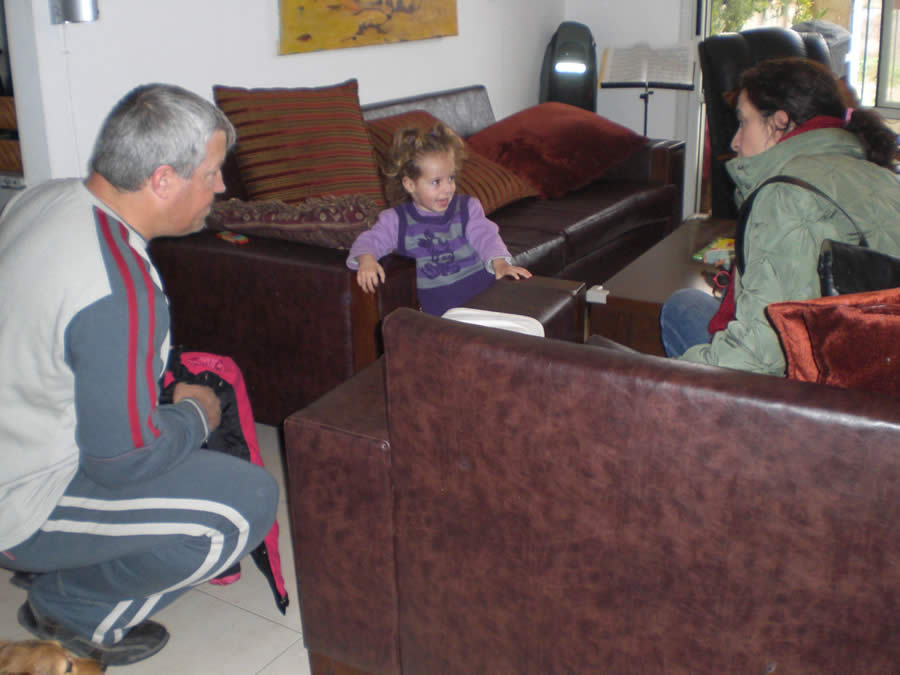
The Evening
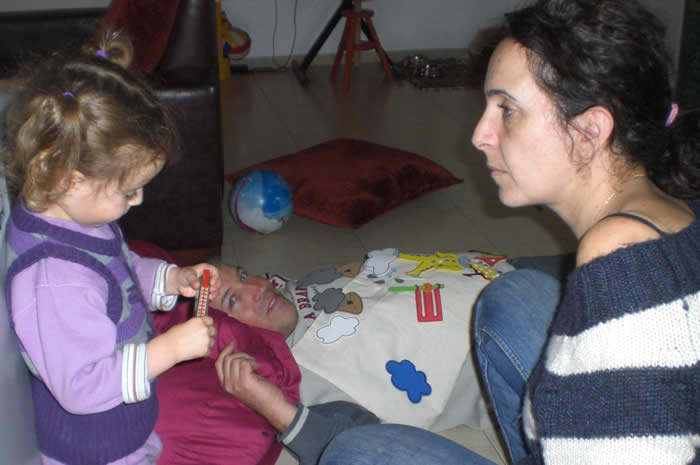 |
The psycho-drama
concerning the doctor's examination
was applied also to Abba,
this time in the living-room,
where there wasn't the cloth of yesterday,
so I handed her another cloth,
and instead of "comforting stickers",
she gave Abba the shapes,
intended for the felt-board
(see below),
which she had just received as a gift from Imma.
|
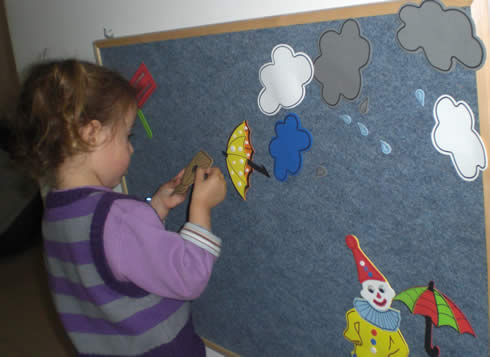 After the synchronicity with the raindrops
yesterday
After the synchronicity with the raindrops
yesterday
- the physical spectacle in the car, when we returned from the
doctor,
and the virtual, metaphorical animation in Tomer's Naruto-animation
-
was - "by chance" - deepened by Efrat's gift:
The theme of the set was "Purim", the symbol of which
is always a clown.
But there were clouds and raindrops too, and Mika placed them
carefully |
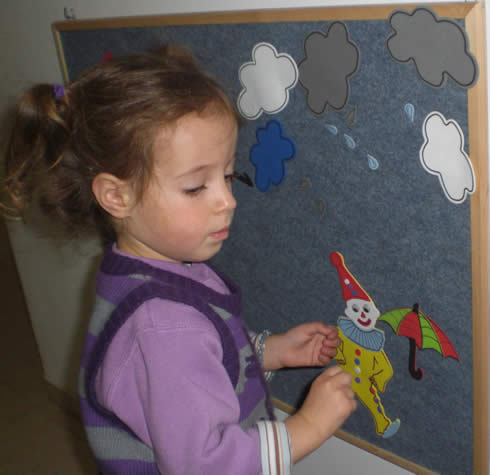 |
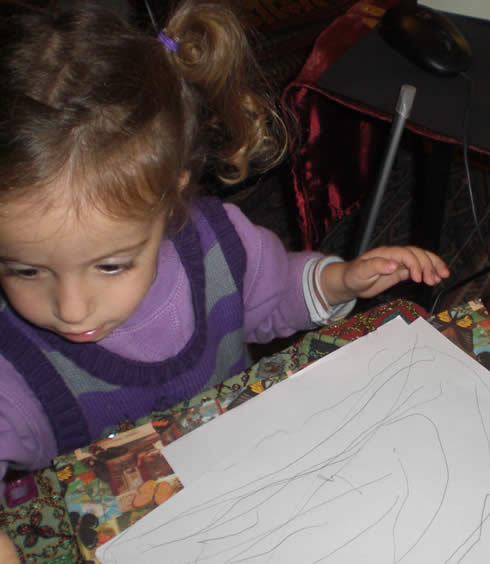 Then she wanted us to go to my room, where
her most recent interest is,
Then she wanted us to go to my room, where
her most recent interest is,
to draw with a pen on paper,
but only on that small unstable table in the corner,
between the computer table and the TV set.
To take these photos, I had to hold the camera with my outstretched
hand
in front of her and shoot blindly. |
|
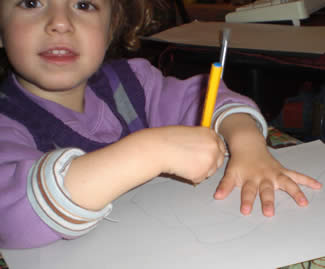
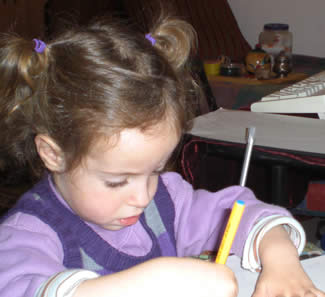 |
What is
interesting, that for the very first time I saw her drawing
with utmost intent
- eliptic lines (right).
Usually she enjoys simply to doodle (left)
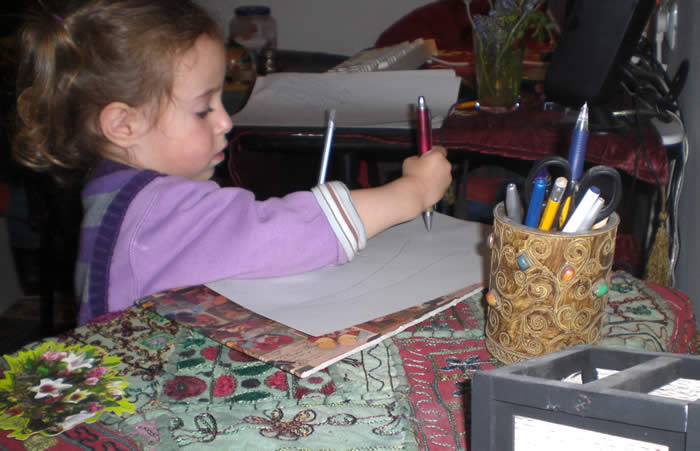 What was also new today, was, that she
said "sabta" for the first time, instead of "satta"
[grandma]
What was also new today, was, that she
said "sabta" for the first time, instead of "satta"
[grandma]
Still- she pronounces "b" instead of "v"
or "w" - like "lebad" instead of "levad"
(I want to be "alone")
|
|
 |
 Abba bathed her, and I was sure, there
was nothing new to document.
Abba bathed her, and I was sure, there
was nothing new to document.
But there was!
This intense activity of pouring bubbles with one hand,
while holding a little tiger in the other! |
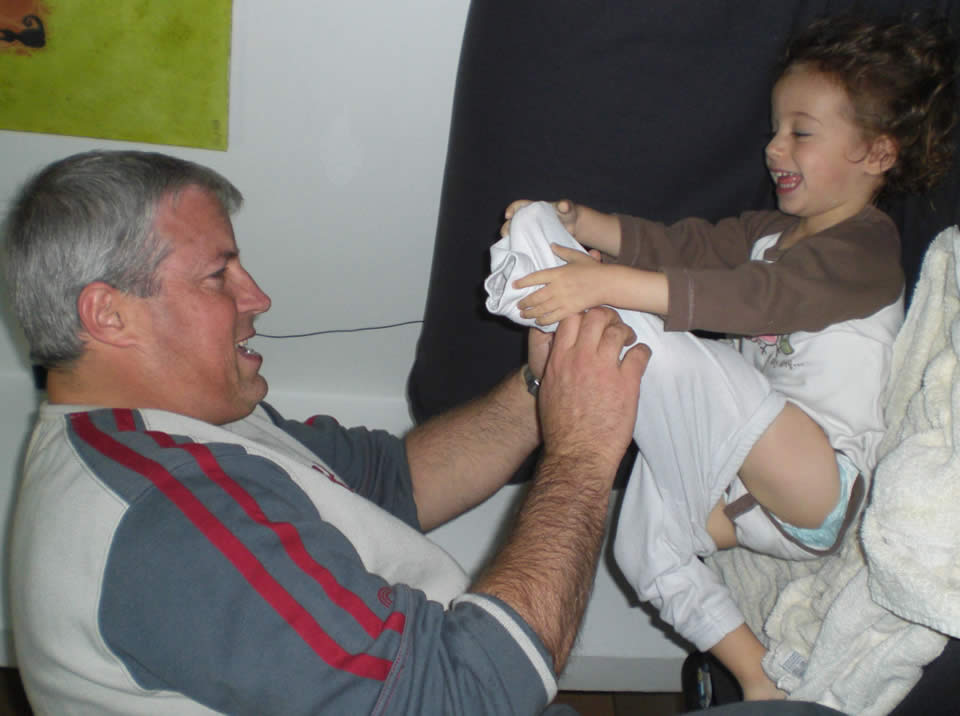
She tries to help Abba with dressing for the
night. Suddenly she looks much older...
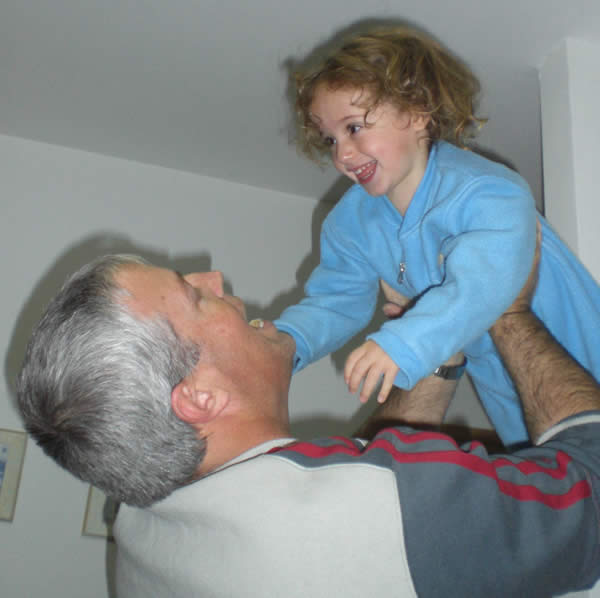
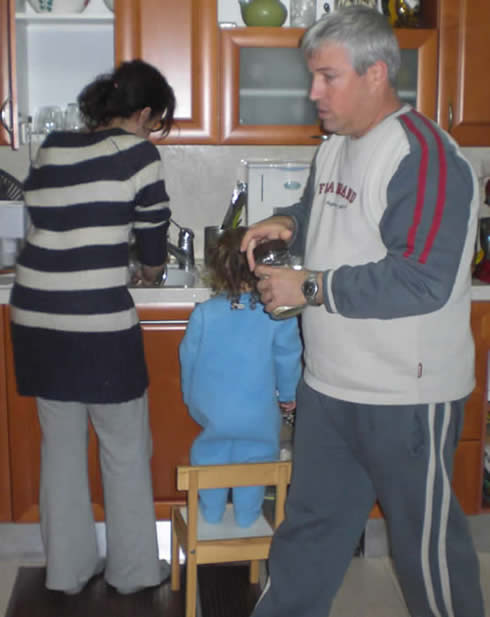 |
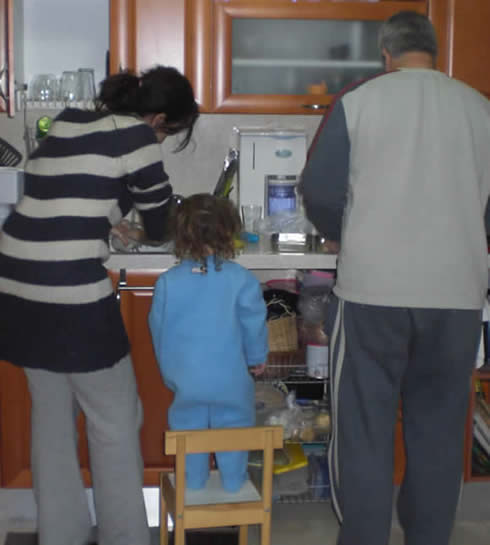 This is my closure of the two days with
the "holy trinity".
This is my closure of the two days with
the "holy trinity".
In a few moments, the "putting-to-bed ritual" will
begin,
and tomorrow morning - after a last dressing-etc.-ritual,
"Abba goes to work, to the
aeroplane". |
back to past ~~~~~
forward to future
home
~ library of seven years
~ intro to k.i.s.s.-log ~ contact
whole&full-filled,
never perfect&complete


Keep It
Simple Sweetheart
K.I.S.S.
- L O G 2
0 0 8
|



 DELICIOUS
DELETION
DELICIOUS
DELETION




